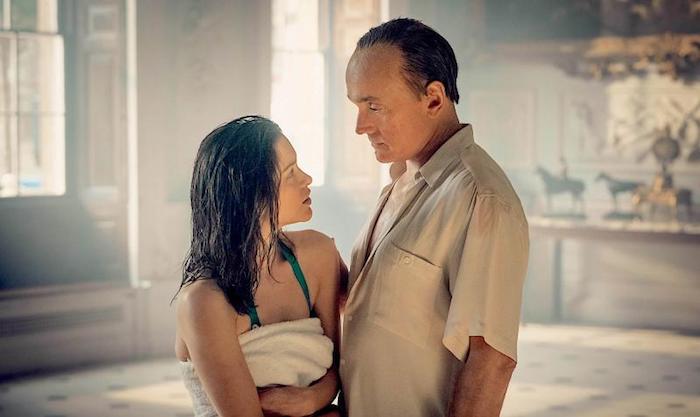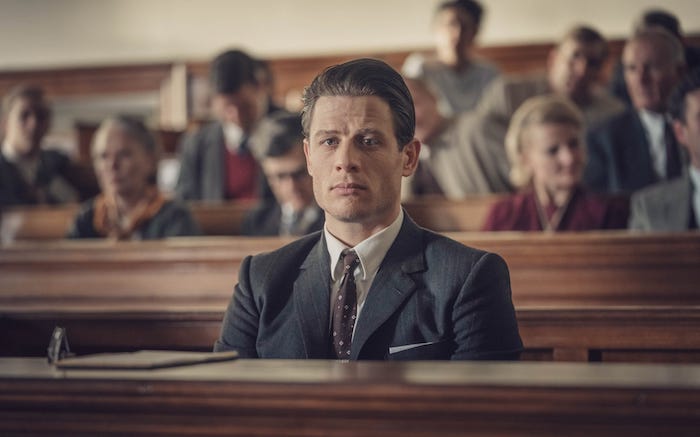HBO Max's 'The Trial of Christine Keeler' is Entertaining, But Doesn't Have Much to Say

The six-part drama The Trial of Christine Keeler was originally released in the U.K. in December of last year and is now streaming on HBO-MAX. Apparently, the intention of the all-woman production team - writer Amanda Coe (Apple Tree Yard), Director Andrea Harkin, and Producer Rebecca Ferguson - was to tell the story of the infamous 1960s scandal's female protagonist; but has anyone ever ignored the presence of Christine Keeler in the sorry story of the Profumo Affair? Inevitably, the series will be compared to Amazon Prime’s A Very English Scandal, but where that series was a jolly all-boys-together romp, The Trial of Christine Keeler is a far sadder and darker exploration of male power and female sexuality.
This is a story about the powerless, defined by race, class, education, or gender, losing out against the male, white, upper-class Establishment of Britain in the early 1960s. This period was by no means the swinging sixties. Prime Minister Harold MacMillan and his Conservative government are still in power, and a series of disjointed scenes jumping around over a few years set the stage for what happened. Meet Christine Keeler (Sophie Cookson)—young, pretty, barely educated, in search of fun in London with vague aspirations of a career as a model or an actress by way of exotic dancing. She lives with a Black boyfriend, Johnny Edgecombe (Nathan Stewart-Jarrett), who’s trying to find work but invariably discovers a white man got there first. Does she view the nasty comments from white passers-by when she and Johnny kiss on the street as toxic racism? More likely she just enjoys shocking the neighbors, just as she enjoys sex, Caribbean music, drugs, and nightclubs.
Enter the osteopath to the rich and famous, Dr. Stephen Ward, played brilliantly by James Norton (Grantchester), an ingratiating voyeur ascending the slippery slope of social advancement. He’s relatively posh, but not that posh, and the truly powerful make sure he’s reminded of his lower status. He is there, after all, to provide them with exclusive services, the proprietor of a sexual buffet. Netflix’s The Crown covered the Profumo Affair with a great deal of imagination (must we remind you again that series is fiction, not history?), but it’s true that Ward liked art and he did sketch various members of the Royal Family. He meets Christine at the club where she dances and promises her ... fun. And he addresses her as “Little Baby,” which is creepy in the extreme.

Christine and her friend Mandy Rice-Davies (Ellie Bamber), who we first meet as the very young mistress of slum landlord Peter Rachman (Johnny Coyne), both become intimate, although not necessarily in a sexual way, with Ward. Christine accompanies Ward to Cliveden, the posh country house of Lord Astor (Michael Malone), whose parties are infamous for sexual dalliances. It’s there that she first meets Jack Profumo (Ben Miles), Minister of War. She is, by the way, 19. Profumo, decades older, is an ambitious politician with his eye on Conservative party advancement and he’s slated to be the next Prime Minister. Miles does a splendid job of portraying steely-eyed charm and self-interest, although his relationship with his complicit, sophisticated wife Valerie (Emilia Fox) is by far more interesting than his dalliance with Christine.
Profumo’s affair with Christine lasts only a few months, and under normal circumstances would not have interested anyone except for the fact that Christine was also involved with the dashing Eugene Ivanov (Visar Vishka), a USSR Military Attache, who drops round to Ward’s apartment for poker games and more. This, remember, is the height of the Cold War. Ward, we learn, has ambitions to become involved in espionage, and broker world peace. MI-5 resents the intrusion of an upstart amateur, and keeps an eye on him and his visitors.
There is very little evidence of any security breach, but then the two sides of Christine’s life converge. She’s still seeing Johnny, but she’s stalked by a rival, Lucky Gordon (Anthony Welsh). A fight starts at a club and Jonny knifes Lucky. After that, Christine doesn't feel safe and she demands that Johnny get her a gun. She moves into Ward’s apartment, and Johnny, furious at her desertion, turns up and fires the gun outside, demanding entrance. The police are called, and Johnny is arrested.
This puts into play a series of escalating events where Christine makes some bad choices, and given her life experiences, it’s no surprise. She’s already turned down a potential permanent lover, elderly lawyer Michael Eddowes (played with extraordinary sweetness by Anton Lesser), because, as she tells Mandy, she doesn’t want an old man. She’s been sexually abused by older men, we learn, from an early age, and aborted a child when she was sixteen. Her relationship with her mother is toxic.
Christine, Mandy, and Ward are friends, although despite the affection between them you get the impression he would not hesitate to use the two young women in about any way he could for his own benefit. Christine is no feisty heroine seeking justice; she, like Ward, is out for what she can get, and she’s started negotiations with the Daily Mirror, a left-wing newspaper interested in discrediting Profumo and the Conservatives.
Johnny’s trial is coming up, with Christine as a prime witness. But she disappears, having gone on holiday to Spain. Ivanov is recalled to Russia, and the press, sensing a scandal, increases speculation about her relationship with Profumo. It’s becoming clear that the Establishment is seeking revenge on Ward for upsetting the status quo and dabbling in espionage, and fear what secrets he or Christine may leak about upper-class sexual indiscretions. Johnny, given a seven-year prison sentence, is yet another scapegoat.
Profumo, questioned in the House, is asked about his relationship with Christine. He denies that there was any impropriety.

Ward is arrested for living off immoral earnings, a case almost certainly brought about for revenge, and his life falls apart. He discovers that his influential and aristocratic friends no longer want anything to do with him, and he has little in the way of resources. His contact at MI-5 no longer takes his calls, and he writes to government officials threatening to reveal the truth about Christine and Profumo. Profumo, summoned back to England from a holiday, admits that he lied to the House and loses his government position. His wife stands by him, but in private she does not hide her fury:
Are we endlessly to blame women for the weakness and wickedness of men? You have no idea. Being a teenage girl is like being invited to a glorious picnic, and then you realize you’re one of the sandwiches.
At Ward’s trial, both Christine and Mandy deny that he was their pimp and claim that if they gave him money it was for household expenses, but the prosecution harshly accuses both women of being prostitutes. Since they’d admitted to multiple lovers and enjoying sex, it was the obvious conclusion. Neither Profumo nor Astor are called to give evidence, although, in one famous exchange, the prosecution points out to Mandy that Astor denies having had sex with her. “Well, he would, wouldn’t he,” she replies, a statement that has gone down in history.
Ward’s life has fallen apart. The day before sentencing he takes an overdose and dies a few days later.
At this point, Christine is the most lusted-after, reviled, and hated woman in Britain, loathed for her sexuality and her beauty. In public, she is pursued by screaming mobs of men and women. She accepted an offer from the police to testify against Ward; in exchange, they agreed to cover up her perjury in regard to an attack by her stalker, Lucky Gordon. It’s really no surprise that after the trial, she is arrested, tried, and imprisoned for perjury. And yet this powerless woman was credited with having destroyed the Conservative Government, forced MacMillan to resign, and brought about the election of Harold Wilson, leading a Labour government. As Lucky Gordon said, seconds after hitting her: "Look what you made me do!"
As well acted as the series is, with a magnificent performance by Sophie Cookson as Christine at its center, and an eloquent portrayal of the zeitgeist of the early 1960s, The Trial of Christine Keeler brings little new to the story. The series emphasizes the racism, classism, and sexism of the period, but we knew those existed—otherwise, why would the tragedy play out as it did? And it was a tragedy, for Christine who never stood a chance, and for Stephen Ward who wanted more of just about everything his background denied him. Christine came to London for fun but found very little; she was, in a word, screwed.
Have you seen this series and if so, did you know about the Profumo Affair beforehand? Did you find that you were sympathetic toward Christine and Ward?



